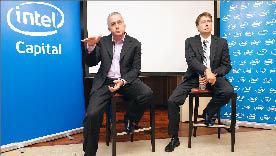Intel Corp yesterday said the price of the first Ultrabooks could be higher than US$1,000 when they make their formal debut on the market by December, but added that there would be models selling for less than that in the fourth quarter.
The US chip giant expected the first series of Ultrabooks to sell for more than US$1,000, which contradicted the “less than US$1,000 price tag” it had claimed at the Computex Taipei trade fair in June.
With shipments expected to ramp up next year, which would drive down component costs, price tags would gradually drop over time, Erik Reid, Intel’s general manager of its mobile client platform division, said in Taipei.

Photo: Chen Ping-hung, Taipei Times
PC makers such as Asustek Computer Inc (華碩), Lenovo Group Ltd (聯想), Acer Inc (宏碁) and Hewlett-Packard Co have committed to the rollout of notebooks using the Ultrabook platform.
Ultrabooks, deemed competitors of Apple Inc’s super-slim MacBook Air, aim to marry the performance of a laptop with tablet-like features.
They will be thin, light and powerful, less than 21mm thick and sell at “mainstream” prices, according to Intel’s statement.
The chipmaker is optimistic that more than 40 percent of all consumer notebooks next year will use the Ultrabook platform.
However, Reid said that to achieve that penetration rate “there is a lot of work for Intel.”
Analysts are less convinced that the Ultrabook will gain as high a penetration as Intel claims.
“If Ultrabooks sell for over US$1,000, consumers could opt for better machines within that budget,” said Ryan Lee (李易聰), an analyst with Topology Research Institute (拓墣產業研究所). “Ultrabooks with [the more powerful] Intel Core i5 and i7 chips would have to sell above US$1,300 and that will deter consumers.”
Asustek, which is expected to take the lead by launching the market’s first Ultrabooks next month, said last month that its Ultrabooks would sell for more than US$1,000 unless they use the less expensive, less powerful i3 chip.
The combined cost of the chips, Microsoft Corp’s operating system and solid-state-drive storage already make up half of the Ultrabook’s cost, making it hard to drive down the average selling price, Asustek said.
To give the Ultrabook project a boost, Intel yesterday announced the activation of a US$300 million venture capital fund dedicated to its research and development.
“We expect Asia to take up a big portion of the fund, given it has a pool of original equipment and design manufacturers and this is where many innovations are coming from,” said David Flanagan, managing director of mobile communications and infrastructure at Intel Capital.
The fund will be invested over a span of three to four years in companies building hardware and software technologies for Ultrabook, he said.

The US dollar was trading at NT$29.7 at 10am today on the Taipei Foreign Exchange, as the New Taiwan dollar gained NT$1.364 from the previous close last week. The NT dollar continued to rise today, after surging 3.07 percent on Friday. After opening at NT$30.91, the NT dollar gained more than NT$1 in just 15 minutes, briefly passing the NT$30 mark. Before the US Department of the Treasury's semi-annual currency report came out, expectations that the NT dollar would keep rising were already building. The NT dollar on Friday closed at NT$31.064, up by NT$0.953 — a 3.07 percent single-day gain. Today,

‘SHORT TERM’: The local currency would likely remain strong in the near term, driven by anticipated US trade pressure, capital inflows and expectations of a US Fed rate cut The US dollar is expected to fall below NT$30 in the near term, as traders anticipate increased pressure from Washington for Taiwan to allow the New Taiwan dollar to appreciate, Cathay United Bank (國泰世華銀行) chief economist Lin Chi-chao (林啟超) said. Following a sharp drop in the greenback against the NT dollar on Friday, Lin told the Central News Agency that the local currency is likely to remain strong in the short term, driven in part by market psychology surrounding anticipated US policy pressure. On Friday, the US dollar fell NT$0.953, or 3.07 percent, closing at NT$31.064 — its lowest level since Jan.

The New Taiwan dollar and Taiwanese stocks surged on signs that trade tensions between the world’s top two economies might start easing and as US tech earnings boosted the outlook of the nation’s semiconductor exports. The NT dollar strengthened as much as 3.8 percent versus the US dollar to 30.815, the biggest intraday gain since January 2011, closing at NT$31.064. The benchmark TAIEX jumped 2.73 percent to outperform the region’s equity gauges. Outlook for global trade improved after China said it is assessing possible trade talks with the US, providing a boost for the nation’s currency and shares. As the NT dollar

The Financial Supervisory Commission (FSC) yesterday met with some of the nation’s largest insurance companies as a skyrocketing New Taiwan dollar piles pressure on their hundreds of billions of dollars in US bond investments. The commission has asked some life insurance firms, among the biggest Asian holders of US debt, to discuss how the rapidly strengthening NT dollar has impacted their operations, people familiar with the matter said. The meeting took place as the NT dollar jumped as much as 5 percent yesterday, its biggest intraday gain in more than three decades. The local currency surged as exporters rushed to